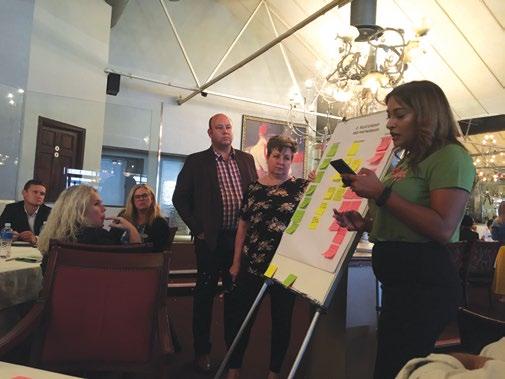
4 minute read
SITE Africa Hosts Tourism Masterplan Workshop
SITE Africa recently unpacked essential keys for growing the tourism industry in a recent workshop in Cape Town. Musawenkosi Gebuza reports.
The Tourism Master Plan Workshop took place at Pigalle Restaurant in Cape Town on 28 January 2020. The workshop was aimed at assisting the tourism industry as a whole, as well as other institutions to target national and foreign investors for the development of the tourism sector.
Advertisement
Dean Allen, Author, Historian and Lecturer at the University of South Africa; Ilse van Schalkwyk, Chief Director of the Economic Sector Support at Western Cape Government; and Amanda KotzeNhlapo, the Chief Convention Bureau Officer at the South Africa National Convention Bureau; were the speakers at the workshop. Here’s a look at the highlights from the afternoon session.
Prioritise Investment Although South Africa already has the competitive advantage of well-developed infrastructure, with the recently set goal to attract 21 million tourists to South Africa by 2030 there is room for capacity expansion to support higher and greater volume of tourists. Investment is required to build more visitor accommodations, increase airport capacities and expansion in the public transportation sector as well as investment towards new products.

Ilse Van Schalkwyk said: “Greater budgetary support for tourism agencies is required and measures should be introduced to protect their budgets from the negative impact of currency fluctuations given their impact on marketing in foreign destination.”
“It is also important to implement focused and flexible industrial and trade policy to promote competitiveness and facilitate growth in the long run,” she added.
Relationships and Partnerships The underlying momentum to partner, or the key motivator to co-operate, is that
all partners, whether from the private or the public sector, will benefit from the alignment of resources. Partnerships, in fact, form for a variety of reasons.
“Partnerships can be formed to create new products or services, to achieve higher levels of efficiency or economies of scale, to open markets that were previously inaccessible or to simply pool resources,” said Ilse, elaborating the importance of partnerships and relationships in the industry.
Adding to her point, Dean Allen said that, “Amongst many other ways of encouraging relations and partnerships in the tourism sector, it is by driving inclusive growth of a sustainable and responsible tourism industry, and, in so doing, addresses transformation and ensures benefits flow to communities.” He added that sports is one of the key elements in forming partnerships and relations for greater outputs.
It is also integral that the public tourism sector is driven through to working collaboratively with the private sector, partnering with South African Tourism, the Department of Tourism, the provincial tourism authorities and departments, and with municipalities with active tourism departments and entities. A well-functioning operational partnership between the private sector and government is necessary to market a country as a key destination of interest and draw on industry’s expertise and synergising marketing activities.
Destination: Position and Promotion Township entrepreneurs have mushroomed in recent years to cater to the curiosity of both local and foreign travellers. There are now many knowledgeable tour operators and world-class accommodation establishments in townships.
Tourism bureaus all over the continent now distribute pamphlets and booklets about attractions in various
townships, along with tips on how to get the best out of the experience.
“This is extremely important in terms of South Africa’s overall tourism experience, as it adds to the authenticity of any tourist’s experience. They have become major visitor attractions, offering everything from clean, comfortable and homely B&Bs and eateries, to fascinating historical sites and a vibrant nightlife,” Ilse explained.
New Product Offerings Rural tourism strategies have earmarked the importance of heritage and cultural offerings as some of the fastest emerging competitive niche tourism products within the global industry, while abundant natural resources act as a primary attraction for visitors.
“To achieve this, the Ministry’s blueprint speaks of a need to promote a ‘culture of travel’ among locals, a policy requiring higher levels of investment and resources at all levels of the industry. The new resources would be used for expanded marketing campaigns and for choosing and supporting priority segments,” said Ilse.
Campaigns such as ‘It is your province, enjoy it’ in the Northern Cape, are new attraction products and are focused on the various routes in the region. These entice travellers to veer off the beaten track to explore the hidden gems and subsequently spend more time in said province.
They usually connect little towns and villages between South Africa’s highways and offer visitors a glimpse into the heart, culture, and history of this magnificent province.
SITE Africa brings value both to the global and local chapter level by networking, online resources, education, certification and advocacy. For more information visit www.siteglobal.com










